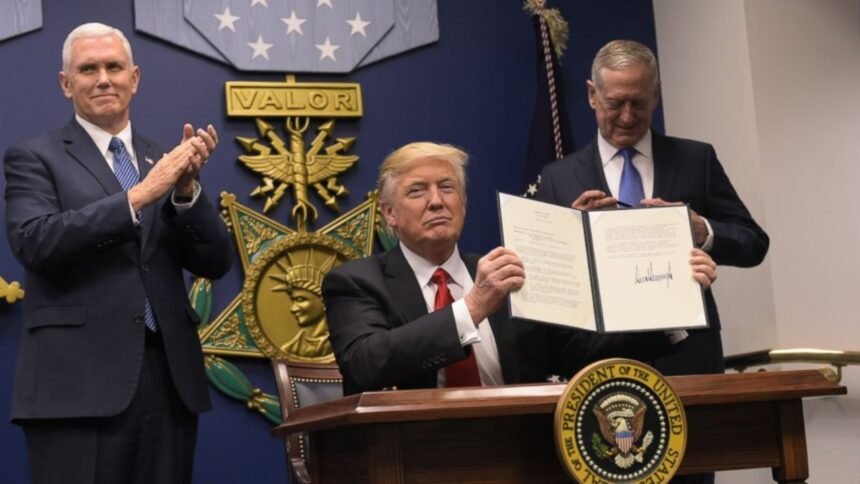The suspension of the refugee program by President Trump was formally announced in early 2017, shortly after his inauguration. The key reason given for this move was to conduct a radical review of the vetting processes to ensure that only individuals who do not pose a security threat could be admitted. In the administration’s view, the existing system was vulnerable and potentially allowed people with dangerous intentions into the United States.
Moreover, the suspension was tied to broader immigration policies that emphasized stricter border control and prioritizing American citizens’ safety. The administration argued that the U.S. had to reconsider its refugee intake numbers and procedures in light of global security concerns, particularly after high-profile terrorist incidents overseas.
This pause, however, was not indefinite but meant as a temporary halt until improvements could be made to the system. Nonetheless, it resulted in a significant reduction of refugees entering the U.S. during that period.
Impact on Refugees and U.S. Humanitarian Role
The suspension had immediate consequences for many refugees awaiting resettlement in the U.S. Many families who had already undergone months or even years of vetting found themselves in uncertainty. The halt disrupted the traditional humanitarian role that the U.S. had played for decades, as one of the world’s leading resettlement countries.
Historically, the U.S. refugee program has been a cornerstone of American values, offering safety and hope to people fleeing war, persecution, and violence. According to statistics from the U.S. Department of State, before the suspension, the U.S. annually admitted tens of thousands of refugees from various parts of the world, including Syria, Iraq, and other war zones.
The suspension sent a strong message worldwide, signaling a shift toward a more cautious and restrictive approach to refugee admissions. This change drew criticism from human rights organizations, who argued that the U.S. was turning its back on vulnerable populations in desperate need of protection.
Security Concerns and Vetting Procedures: Balancing Safety and Compassion
The administration’s focus on national security centered on concerns that terrorist groups could exploit the refugee program to infiltrate the U.S. To address these fears, officials sought to strengthen background checks, biometric screenings, and information sharing with intelligence agencies.
However, experts in immigration and security fields caution that such measures must balance security needs with humanitarian obligations. Dr. Sarah Johnson, an immigration policy analyst at Georgetown University, states:
“While national security is paramount, it is essential to remember that the vast majority of refugees are fleeing terror and oppression themselves. Effective vetting should protect the public without undermining America’s commitment to human rights.”
Research published in the Journal of International Migration and Integration supports this perspective, showing that refugees admitted through rigorous vetting have an extremely low risk of involvement in criminal activities or terrorism (Kanstroom, 2017).
Political and Social Reactions to the Suspension
The suspension of the U.S. refugee program sparked varied reactions across the political spectrum. Supporters regarded it as a necessary step to prioritize American citizens’ safety and re-examine immigration policies. Critics saw it as an abandonment of American values and a move that damaged the country’s reputation.
Many states and cities expressed concerns about the suspension’s local impact, as refugees often contribute positively to communities, economically and socially. Non-governmental organizations (NGOs) that aid refugee resettlement reported increased challenges in their operations due to the decreased inflow of refugees.
Furthermore, the suspension intensified debates about immigration policy, border security, and America’s global leadership in humanitarian issues. It highlighted the complex tensions between security, compassion, and international responsibility.
The Path Forward: What Does the Suspension Mean Today?
While President Trump’s suspension considerably altered the refugee landscape, subsequent administrations have taken steps to restore and reform the program. The Biden administration, for example, announced plans to increase refugee admissions and enhance vetting procedures to be both secure and humane.
Nevertheless, the legacy of the suspension remains. It underscored vulnerabilities and exposed challenges in balancing national security with refugee protection. Policymakers today continue to grapple with these issues, aiming to craft sustainable policies that honor America’s humanitarian traditions while ensuring safety.
Academic studies propose that transparent, evidence-based approaches to refugee admissions can improve public trust and policy effectiveness (Betts & Collier, 2017).
Conclusion: Reflecting on President Trump’s Suspension of the U.S. Refugee Program
President Trump’s decision to suspend the U.S. refugee program was a pivotal moment in American immigration history. It highlighted critical concerns about national security, reshaped refugee admissions, and ignited widespread debate. While aimed at protecting the country, the suspension also challenged America’s role as a beacon of hope for displaced people worldwide.
As the U.S. moves forward, balancing compassion with security remains a delicate but necessary endeavor. Understanding the lessons from this suspension can help inform policies that protect citizens and uphold humanitarian values alike.






